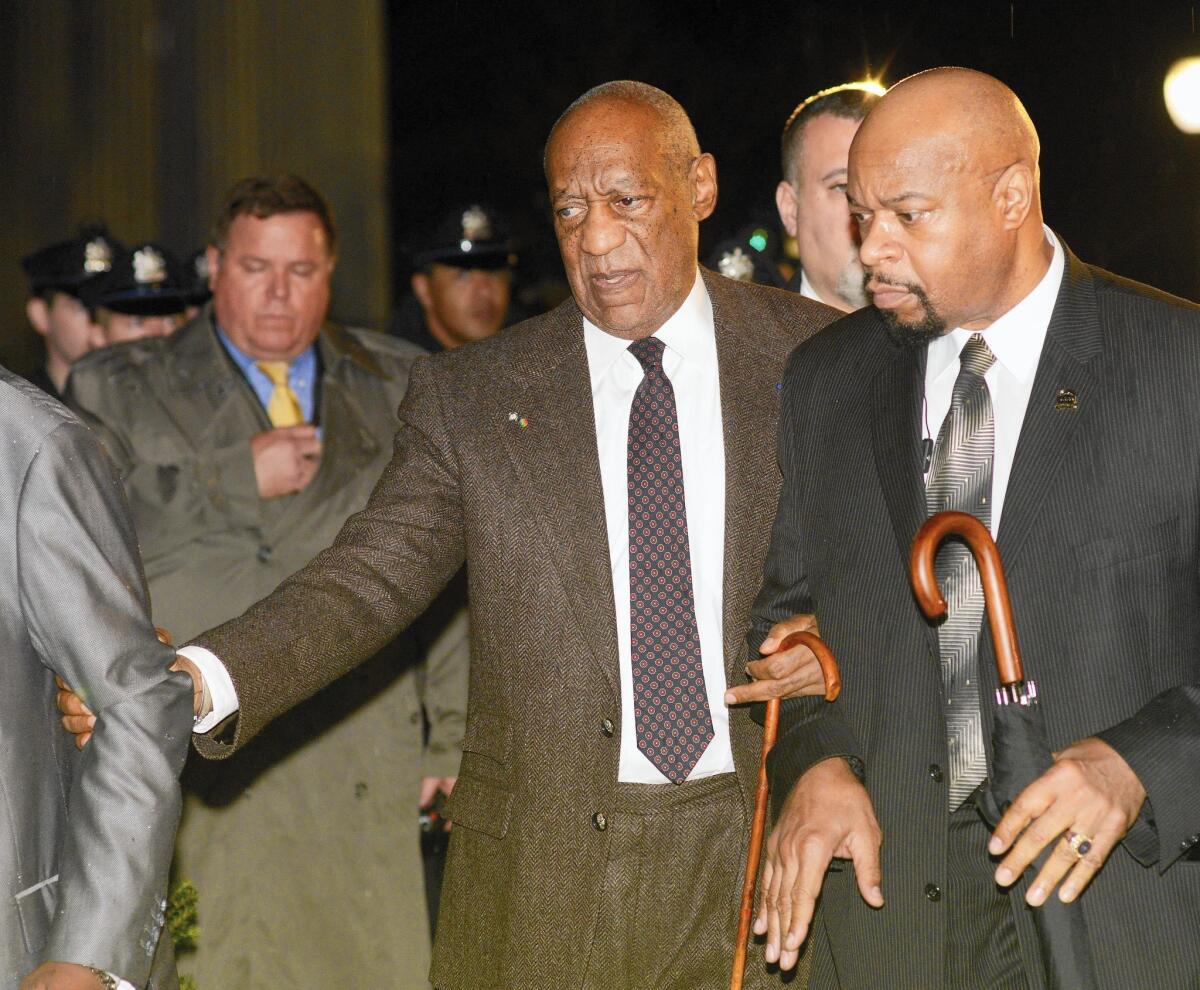Bill Cosbyâs court defeat: How it happened, and what happens next

Bill Cosby leaves the Montgomery County Courthouse in Norristown, Pa., where he is accused of criminal sexual abuse, after a pretrial hearing on Feb. 3.
Bill Cosby suffered a defeat in court Wednesday evening.
Actually, he suffered two defeats.
In addition to rejecting a bid to dismiss the three counts of sexual assault against him, a Pennsylvania judge also turned down a request by Cosbyâs lawyers to remove newly elected Montgomery County Dist. Atty. Kevin Steele from the case. Steele had campaigned on a prosecute-Cosby platform, and the defense said he couldnât argue it fairly.
The judge, Steven OâNeill, disagreed.
Wednesdayâs developments mean the road to a trial is now a lot clearer. Instead of going away, the charges will now yield a preliminary hearing on March 8 to determine whether the prosecution has enough evidence to win in front of a jury. If the judge â a new one, Elizabeth McHugh â determines it does, the case moves to a full-blown trial. Experts think this is likely to happen.
A trial would be a weighty affair. The incident in early 2004, in which Cosby provided unidentified pills at his Pennsylvania home to former Temple University basketball employee Andrea Constand and then penetrated her with his fingers, is charged in its own right.
Was the act consensual, as Cosby has argued? Or was it an unwanted and illegal violation, as the prosecution has said?
Victims of sexual assault and womenâs groups, however, see a larger issue. A trial, they say, would offer a chance to level the scales with Cosby, against whom more than 50 other women have made similar accusations, and even settle the score in what they argue is a larger culture of privileged men who routinely get away with sex crimes.
Just a few days ago, the defense looked like it had a chance to make the charges disappear.
So how did we get to this place? Hereâs how Cosbyâs case stalled in a Pennsylvania courtroom.
The agreement
The defenseâs star witness was Bruce Castor. Castor was district attorney when the incident happened, and the person who the defense said made an ironclad oral agreement not to prosecute Cosby in perpetuity.
Castor said he had told his intentions to Walter Phillips, Cosbyâs longtime criminal attorney, and no one else. The problem is Phillips died last year, leaving only one side of the party to testify to it. Whatâs more, Castor shied away from actually calling it an agreement â he demurred when pressed by attorneys. OâNeill sought to clarify: âSo it was an agreement with yourself?â
Why would Castor make such an agreement? He has some unconventional reasoning. More on that in a bit.
The news release
To provide evidence for this promise, Castor and the defense pointed to a 2005 news release announcing Castorâs intention not to prosecute Cosby. Castor took the unusual step of writing and signing it himself, which the defense argued gave it legal force. But Judge OâNeill queried him on why, if he was making a binding commitment, he didnât tender something more official, pointing out the ways he could have filed it with the court.
Equally problematic for the defense was the phrasing in the news release. Castor wrote in it that he would âreconsider this decision should the need ariseâ â fairly open language that leaves room for it to be recanted.
Join the conversation on Facebook >>
The 5th Amendment
Castor said he personally believed Cosby was probably guilty. But he didnât think the case was winnable, and opted against prosecuting to help the victim â by doing so, he said, he would remove Cosbyâs privilege to plead the 5th Amendment in a civil suit.
The argument was undercut, however, when lawyers for the victim, Dolores Troiani and Bebe Kivitz, testified that Castor had never informed them of this rationale, a notable omission if he was in fact trying to help their case. And the idea of a prosecutor acting on this motivation is odd, experts say.
âWhen you cut a deal to give someone immunity you want to get something in return,â said Dennis C. McAndrews, a former Philadelphia-area prosecutor, noting such benefits as witness testimony. âItâs not a prosecutorâs job to enhance a civil case for a victim.â
The deposition
Part of why the defense argued the case shouldnât move forward is because Steele reopened the investigation in the wake of the unsealing last summer of a deposition from the 2005 civil suit. In it, Cosby admitted he had previously bought Quaaludes to facilitate sex with women. And that testimony, the defense argued, was given when Cosby believed he had criminal immunity.
The judge, however, noted that details from the deposition were only a part of Steeleâs case â and, in any event, the specific matter of whether the deposition material was admissible could be argued in a separate hearing without derailing the whole case.
---
That hearing is, in fact, one of several legal matters that could be decided in advance of a trial. Another could involve Cosbyâs competency to stand trial in the first place. Heâs 78, appears frail, and his vision problems have been on display this week, with aides guiding him and out of the courthouse.
Also coming under scrutiny in a likely pretrial hearing is the hot-button question of whether testimony from other women Cosby allegedly assaulted will be allowed.
Pennsylvania does allow such testimony if itâs pertinent in establishing a pattern of conduct or signature crime. The matter will be decided in whatâs known as a motion in limine, in which prosecutors will probably argue that the testimony is necessary for exactly these reasons and a defense will contend that itâs irrelevant to this case.
One alleged victim who will certainly be testifying is Constand. She is likely to take the stand on March 8, as prosecutors seek try to convince a judge that there is sufficient evidence to win a case. Sheâll offer her version of what happened that night in Cosbyâs home.
The trial will have not yet begun, but the media storm certainly will.
Twitter: @zeitchikLAT
ALSO
BMX and X Games star Dave Mirra dies at 41 in apparent suicide
Girl texted with Virginia Tech student before being stabbed to death, prosecutor says
After Texas stopped funding Planned Parenthood, low-income women had more babies
More to Read
Sign up for Essential California
The most important California stories and recommendations in your inbox every morning.
You may occasionally receive promotional content from the Los Angeles Times.











